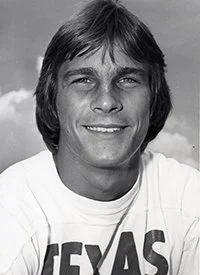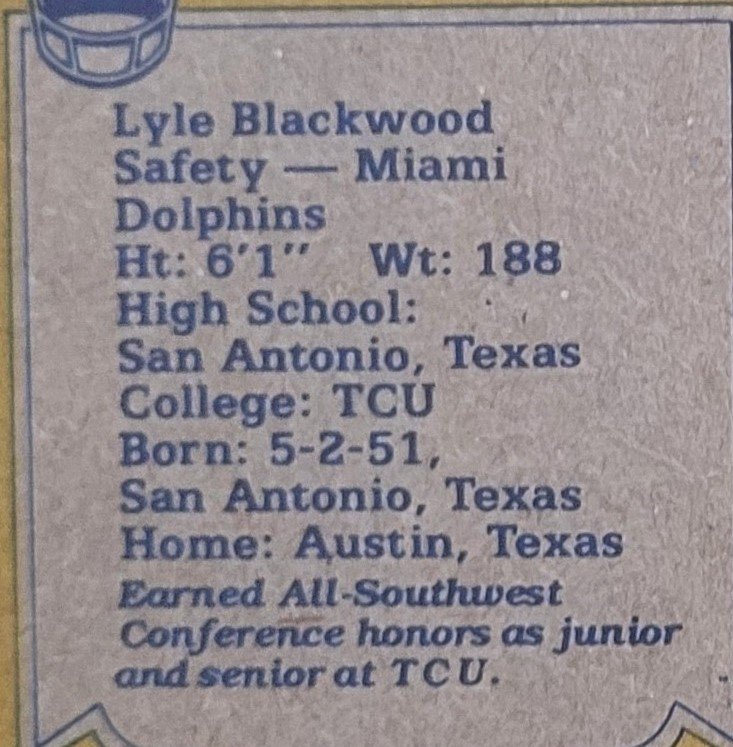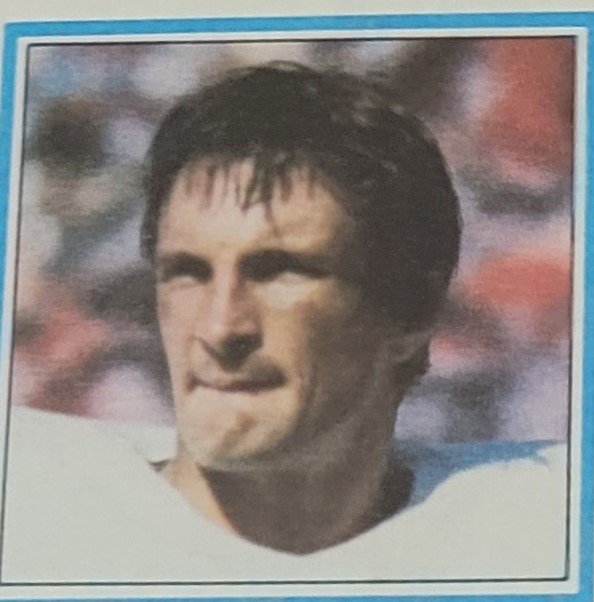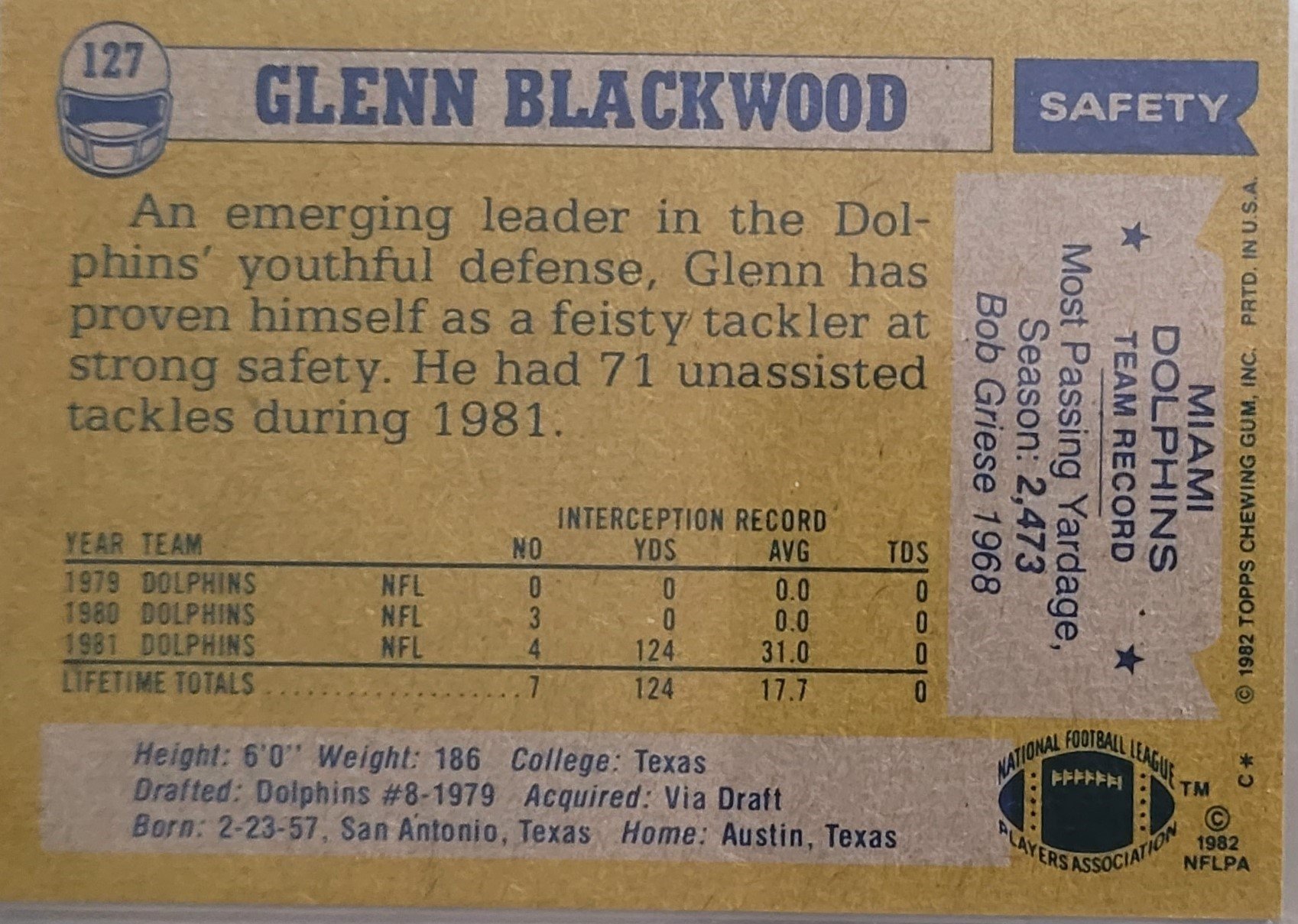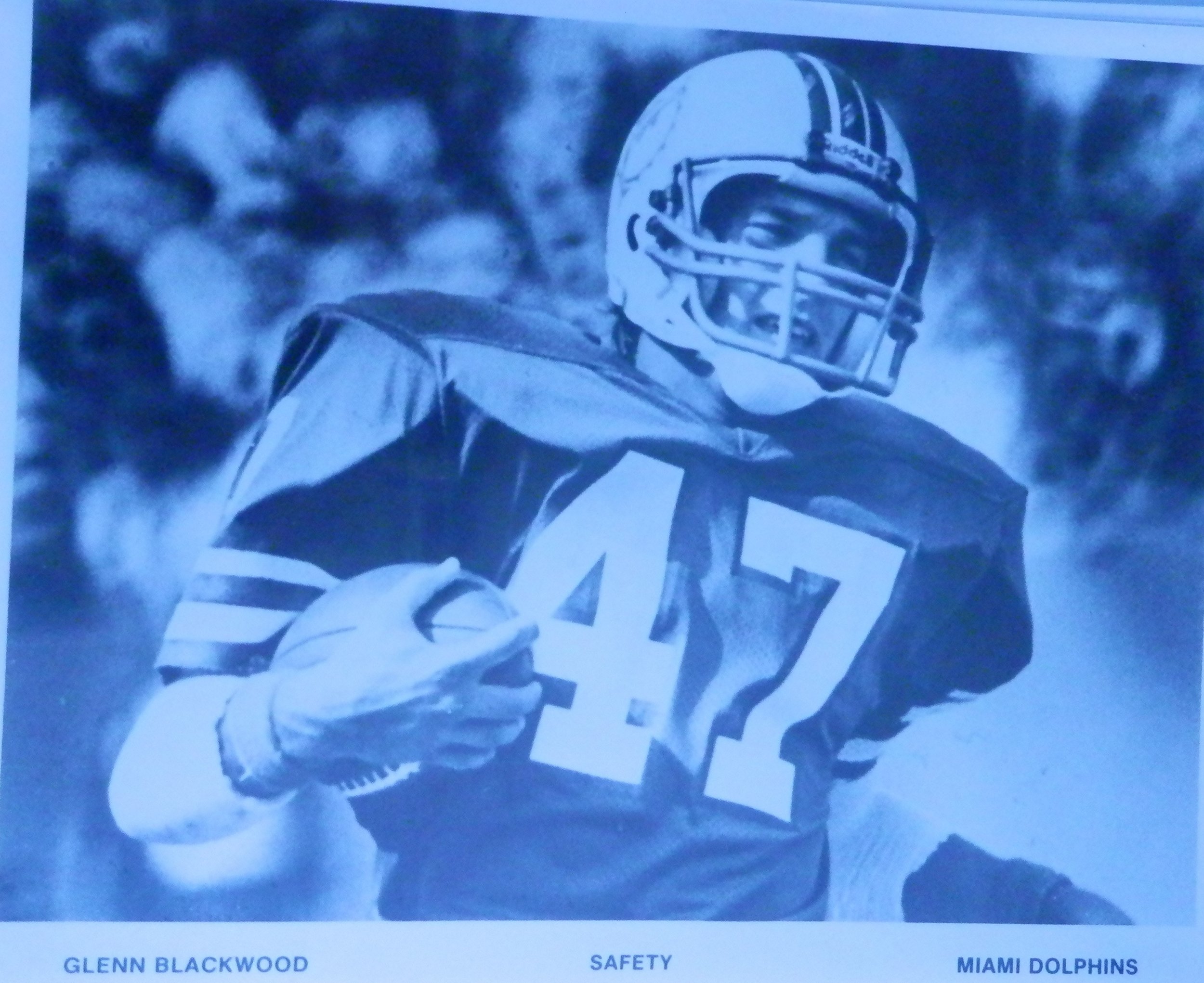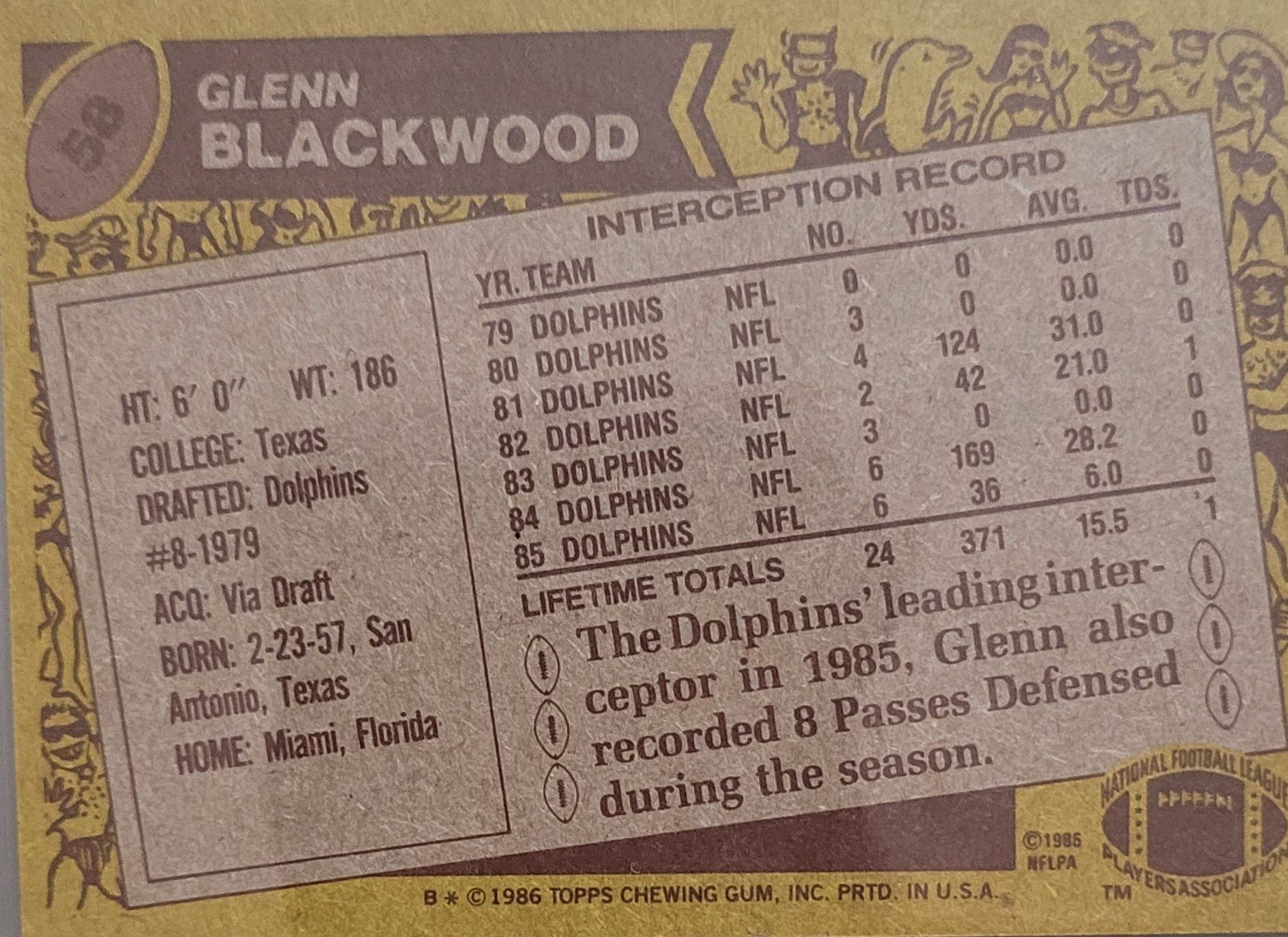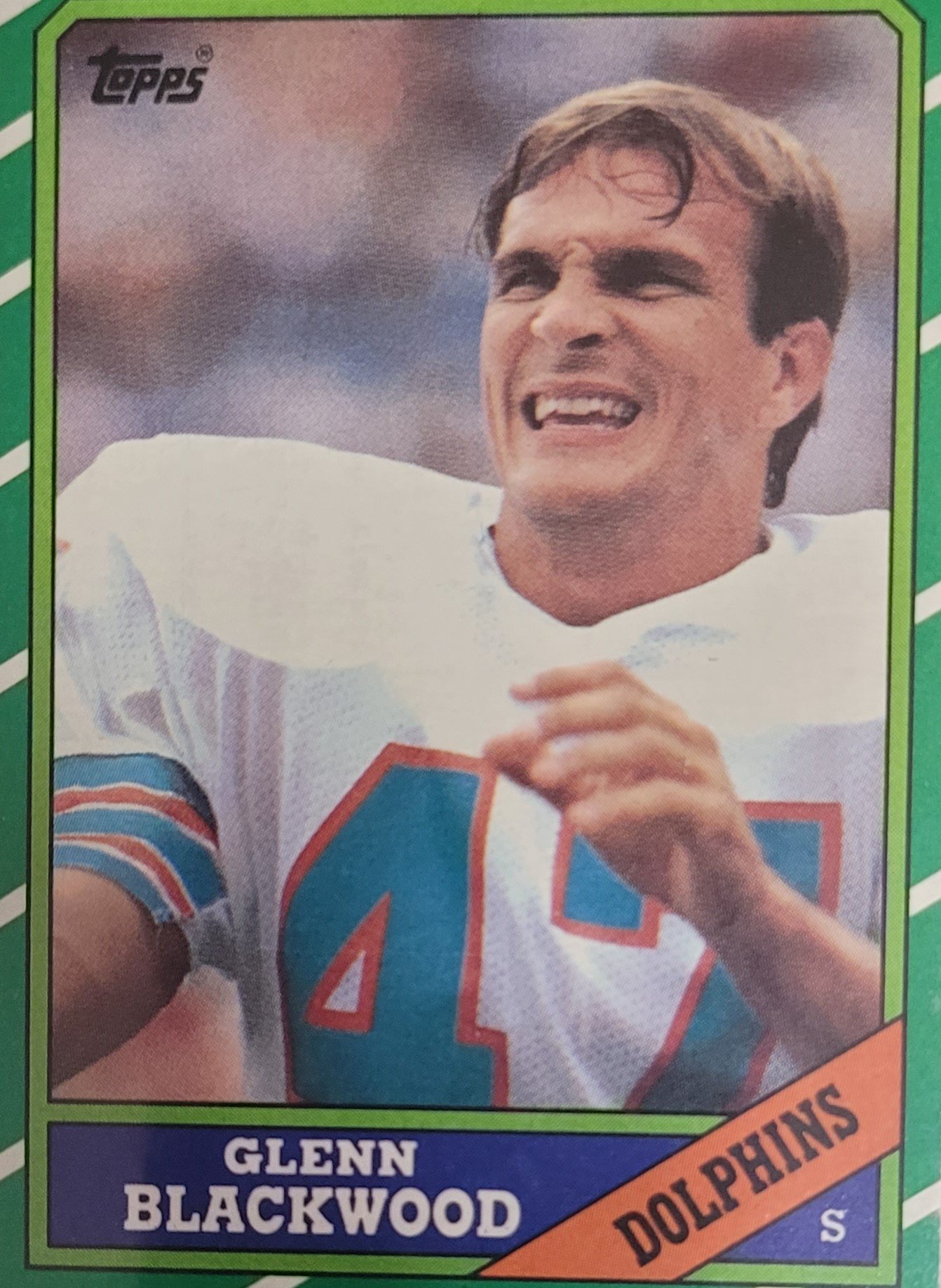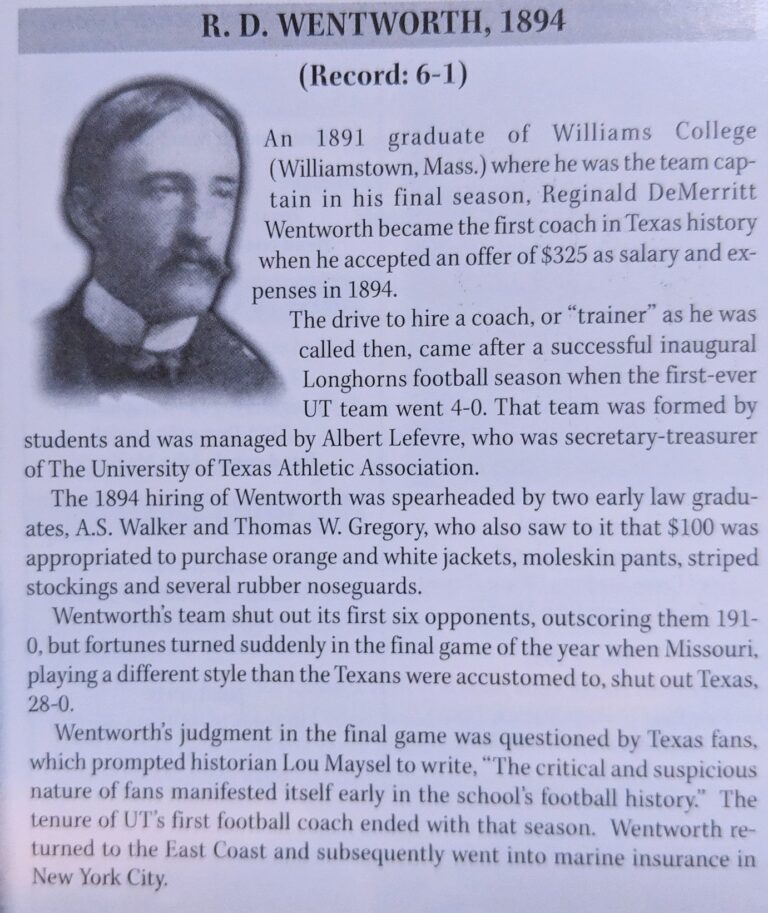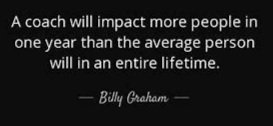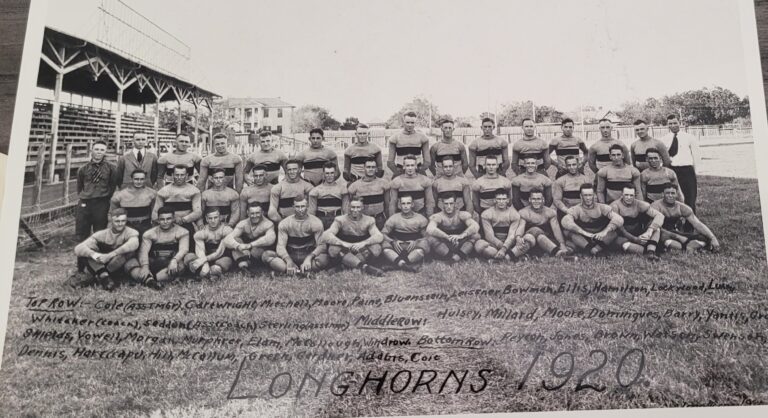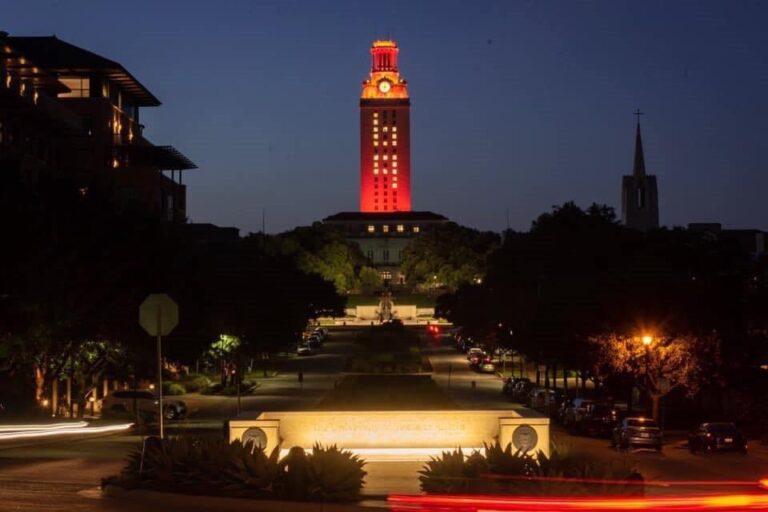Glenn Blackwood
Glenn Blackwood
Glenn Blackwood’s oral history podcast, text, and photos are sponsored by Beth Coblentz.
GLENN BLACKWOOD: BRUISING, STINGING KILLER “B”
by Larry Carlson ( lc13@txstate.edu )
Glenn Blackwood was kind of hot under the collar. After 40 minutes on the phone with me and Chris Doelle of TLSN one recent morning, the former Longhorn (1975-78) and Miami Dolphins (1979-88) defensive back was warming up to a pet peeve. I could hear the frustration in his twangy South Texas tone.
Blackwood had already said he was in the midst of a “mild” case of Covid, but that’s not what stuck in his craw. It was the strutting and preening that he sees — as we all do — after almost every play in college football and the NFL.
Blackwood had already said he was in the midst of a “mild” case of Covid but that’s not what stuck in his craw. It was the strutting and preening that he sees — as we all do — after almost every play in college football and the NFL.
Blackwood’s point was simple. Football is absolutely the ultimate team sport. Good things happen on the field because of teamwork. Nobody makes a play by himself. It’s not tennis or golf or the pole vault.
It’s like life. Husbands and wives, families, co-workers and other assorted teams in all walks, reap positive results through work, play, sacrifice, grit and perseverance. It’s never an accident even when luck comes into play.
Blackwood’s mood brightened when he mentioned what he sees as the prevailing attitude of conduct at his alma mater. “There’s some of the ‘act like you’ve been there’ attitude there now,” he said, saluting the team-first attitude of Bjian Robinson and Roschon Johnson at UT in recent years. Then Glenn mentioned that he never saw the likes of Barry Sanders or former teammate Earl Campbell participate in any hot-dogging after their endless supply of highlight plays. And he emphasized that there’s no need for it now.
“When you go into the end zone, act like you’ve been there before.”
― Vince Lombardi
The native San Antonian was a valuable piece of winning teams at every level for two decades of organized football. He played for Churchill High’s first two district champion teams, then excelled for the Longhorns and went on to a distinguished career in Miami, an absolute steal in the eighth round of the ’79 draft.
Always a heady player, the six-footer had a history of delivering more than was sometimes expected by others. In our interview, he recalled having “one-and-a-half” scholarship offers (a junior college and Howard Payne in Brownwood) before UT — coached by the legendary Darrell Royal with “Iron Mike” Campbell heading the defense — extended a very late offer he eagerly accepted.
His brother, Lyle, had been similarly underrated, going the JUCO route before playing two years at TCU. A ninth-round NFL pick, Lyle was already in his third season with the Cincinnati Bengals when little brother first laced up college cleats.
Even as a freshman featherweight in Austin, not even registering a buck-sixty on the scales, Glenn was a valued backup player. One striking play is still in this writer’s memory bank almost fifty years later, and I brought it up when we spoke. In College Station in ’75, second-ranked A&M was inside the five-yard-line when “Iron Mike” sent a surprised Blackwood in to replace an even more bewildered Raymond Clayborn, All-American and future All-Pro with the Patriots.
Campbell tersely instructed the teenager to not even guard against the pass. Just play the run.
Blackwood hit senior (and future first-round NFL pick) Bubba Bean, a 200-pounder, with such a punch that both players were briefly knocked out. Literally a stunning tackle. I told Glenn that I’d never been able to find a clip of that tackle. He said he had it on his phone. Now I do, too.
Blackwood played two years for Royal and Campbell, two more for Fred Akers and DC Leon Fuller. As a junior in ’77, Akers’ first season as boss, Texas went 11-0 before a Cotton Bowl loss to Notre Dame. Blackwood was in the defensive backfield with three other future NFL performers, Johnnie Johnson, Ricky Churchman and Derrick Hatchett. Glenn had begun to believe that, with his senior season approaching, perhaps he might somehow have a chance to extend his playing days past the college level.
He approached the young defensive backs coach Alan Lowry, who had been All Southwest Conference as a DB in ’71, then as a quarterback in ’72. Could Blackwood have a real chance to play professionally?
“Alan is just such a nice guy, and such an honest guy,” Glenn laughed now. “He just kind of went ‘Well….
uhhh’,…”
So much for the pep talk.
Undeterred, Blackwood shined for a stout ’78 defense and was prepared to give the pros a shot, drafted or not. His good friend Russell Erxleben, the All-America kicker and punter, went to New Orleans as the eleventh pick in the first round. Glenn says he stayed out a bit late and was not an early riser following the big, celebratory night. But somebody at his apartment complex interrupted his long slumber with urgent, insistent banging on the door, asking Glenn if his phone was off the hook.
Turns out that the bleary-eyed Blackwood had indeed bumped the old phone from its cradle and the guy at the door had news that Miami had selected him in the eighth round.
Blackwood bucked the draft odds, producing big for a memorable decade.
Tutored by the estimable Bill Arnsparger, Miami’s defensive coordinator, he developed quickly and stood out in coverage and with big hits. Glenn speaks in awed tones about Arnsparger, even now.
The highlights were many. Blackwood played for five AFL East champions. His team competed in the Super Bowl following the strike-shortened ’82 season and again after the ’84 season. Underrated David Woodley quarterbacked the former squad and magnificent Dan Marino was in charge for the latter. And the ’85 Dolphins memorably put a wrench in the potentially perfect season of the Chicago Bears, who would go on to lift the Lombardi Trophy at season’s end. By beating Da Bears, who came into December at 12-0, the Dolphins preserved their franchise’s fame as the NFL’s only team to ever go unbeaten, back in ’72.
Miami was the place to be, capturing the imagination of the Reagan-era USA.
Headed by granite-jawed Don Shula and showcasing the aerial show of Marino and “the Marks Brothers/Magic Markers” deep threats Mark Clayton and Mark “Super” Duper, the Fish were flashy regulars on Monday Night Football. Their stylish aqua and orange colors became synonymous with America’s image of “Miami Vice,” starring Don Johnson and Philip Michael Thomas as undercover cops pitted against brutally sinister drug lords and their henchmen, all set to a catchy, ground-breaking soundtrack of the coolest tunes of the times.
Midway through his Dolphin days, Glenn was joined in the defensive backfield by big brother, Lyle.
Dubbed “the Bruise Brothers” by media for their crunching style of play, the Blackwoods enjoyed six seasons together, lasting longer than did the TV series that was a hit for only five.
The Bruise Brothers Lyle and Glenn Blackwood
Strong safety Glenn and free safety Lyle also played feature roles in another of the era’s best NFL nicknames, the Dolphin defensive unit known as “The Killer B’s.
Besides those bruising Blackwood boys, the unit boasted five more “B’s” who could sting opponents:
Bob Baumhower, Doug Betters, Kim Bokamper, Charles Bowser and Bob Brudzinski.
Blackwood has long been a business success in his adopted Sunshine State of Florida and told TLSN that he and his wife have eight grandkids with a ninth on the way. He also took time some years back to coach the high school team of his son, Jake, who went on to play at Georgia Tech.
With plenty of vivid memories from playing days at Texas and Miami, the UT Hall of Honor member and senior captain of the ’78 Longhorns is well-stocked in memorable football outcomes. When asked to single out a most savored contest, Glenn chose one that came as a junior, when the top-ranked Horns went into hostile College Station in late November to close out the regular season against #12-ranked A&M.
That day, Earl Campbell essentially sewed up the Heisman with 224 yards on the ground, QB Randy McEachern threw four TD passes and Texas stomped the Ags, 57-28. Blackwood, with a typical bang-up defensive effort, racked up four tackles and returned an interception 22 yards for a big play.
“To go into that place and come out with a big win,” Blackwood laughs, “it was a blast.”
And let it be duly noted that Blackwood and his Texas teammates confidently expected to win.
They had “been there before” in big football games. And always acted that way. It’s what winners do.
Podcast is hosted by Chris Doelle and Professor Larry Carlson and produced by Lone Star Gridiron.
TLSN TLSN TLSN TLSN TLSN
